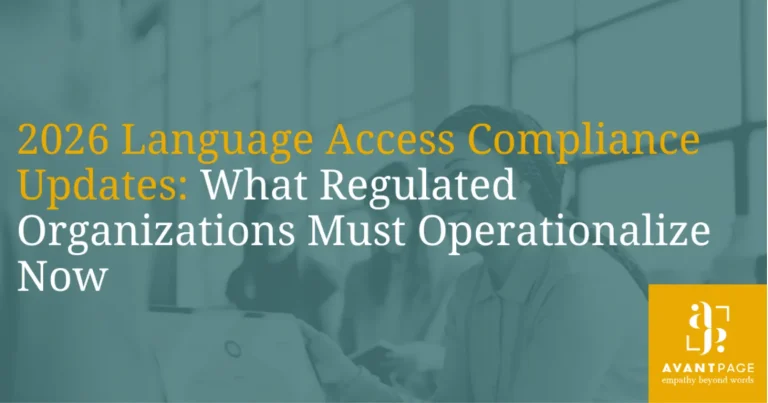How to Host Webinars Using Remote Simultaneous Interpreting
Hosting a webinar for a global audience can be challenging when participants speak multiple languages. How do you make sure everyone follows along? Remote simultaneous interpreting (RSI) delivers real-time translation, keeping all attendees engaged, informed, and able to participate fully.
In this article, we’ll dive into how you can host a webinar using simultaneous interpreting services. If you’re not sure where to begin, a trusted language service provider can help you figure out all the right tools and techniques you’ll need to make your event a success.
Gearing Up for Remote Simultaneous Interpreting (RSI)
Before you host your webinar, you’ll need to partner with a language service provider who offers remote simultaneous interpreting (RSI) services. Two key components to RSI set it apart from other types of interpreting: As the name implies, it’s both remote (i.e., the interpreter is not physically present at the event) and simultaneous, meaning it takes place at the same time the main speaker presents in the original language.
What Is RSI?
Simultaneous interpretation is a particularly specialized style of interpreting. The cognitive effort of listening to the speaker while translating their speech into another language at the same time can be quite strenuous. As a result, simultaneous interpreters often work in teams and they can be a bit pricier than consecutive interpreters, who wait for a speaker to complete any given utterance before translating their message.
How Is RSI Used?
This method of interpreting is typically used for events like conferences and webinars, as they allow people to understand the content of these events in real-time, without having to slow the pace of the presentation. RSI services allow interpreters to conduct their work remotely, making it easier to schedule an interpreter who can do the job from any location in the world — as long as they have a good internet connection.
If you’re planning to host a multilingual webinar and want to provide remote interpreting services, here’s what you need to know to get started. And for more general information on planning a multilingual event, check out our best practices for organizing a multilingual event, which includes tips that work for both remote and on-site events.
How to Coordinate RSI for Your Webinar
RSI services are a great way to provide seamless multilingual experiences for attendees of your virtual event, but it’s important to keep the following factors in mind when commissioning an interpreting service for your event:
1. Give Yourself Time to Find and Book an Interpreter
Providing yourself with ample time to organize all aspects of an event is critical to making sure your event runs smoothly. Just as you’ll want to set a date and coordinate marketing early on, you’ll also want to plan ahead for having an interpreter.
We recommend booking an interpreter at least two weeks in advance, but the more time you have, the better. This is especially true for underrepresented languages, which may have fewer interpreters available.
Learn about remote simultaneous interpreting for high-stakes communication.
2. Let Your Interpreter Know About the Event, Before the Event
Like translators, many interpreters will specialize in certain niches, meaning an interpreter who specializes in medical interpretation may not be the best choice for your webinar on public policy.
When booking an interpreter for an event, you’ll want to be sure to know exactly what topics you plan to cover and provide that information to the LSP and any interpreters you’re working with.
If available, you can even provide the interpreters with any context surrounding the event or materials that will be presented at the event, such as:
- Event flyers
- Speech scripts
- Pre-recorded videos
- PowerPoint presentations
Allowing the simultaneous interpreters access to these materials in advance will help increase the quality of the interpretation for the participants. This information will allow interpreters to prepare for the event and conduct any research that’s necessary beforehand.
3. Conduct a Dry Test Run
We highly recommend conducting a dry test run of the webinar beforehand. You can coordinate this with your LSP, which will ensure that all parties involved in the webinar — the speakers, interpreters, and other organizers — will be familiar with the technology and equipment necessary to run the webinar smoothly.
A dry test run also allows you to check audio channels, speaker volume, participant connections, and video quality, preventing technical issues during the live event.
Things to Keep in Mind as You Present
Working with an interpreter can expand your audience and broaden your horizons, but there are a few key things to consider when working with an interpreter during your virtual event.
To ensure smooth interpretation during your webinar:
- Speak at a steady pace and avoid complex idioms or jargon without explanation.
- Pause between slides or topics to allow interpreters to keep up.
- Direct your speech to the audience, not the interpreters.
- Use visuals or captions to complement the interpretation.
- Prepare for consecutive interpreting during Q&A or panel discussions.
If you’re working with a sign language interpreter, you must have proper lighting so the interpreter can see your facial expressions. Check out these tips on how to work with a sign language interpreter.
Benefits of Remote Simultaneous Interpreting for Webinars
Expands Your Audience
Remote simultaneous interpreting allows participants from around the world to join your webinar without language barriers. By offering real-time interpretation in multiple languages, you can reach a broader audience, increase attendance, and engage participants who might otherwise be excluded.
Accessibility
RSI not only enhances understanding for multilingual audiences but also ensures your event is inclusive for people with diverse language needs. When paired with captioning, interpreters make content fully accessible for attendees with hearing impairments or those who prefer to read along, creating a more engaging and equitable experience.
Compliance
Providing professional interpretation can help organizations meet legal or regulatory requirements for language access, particularly in healthcare, government, or educational settings. Offering RSI demonstrates a commitment to accessibility and inclusivity, which can enhance your organization’s reputation and trust with your audience.
Improved Engagement and Participation
Interpreted webinars enable attendees to ask questions, participate in polls, and interact with speakers confidently in their preferred language. This leads to higher engagement, better feedback, and a more dynamic event overall.
Cost-Effective Global Reach
RSI allows you to connect with international audiences without the need for physical travel or on-site interpreters in every location. This reduces logistical challenges and expenses while still delivering a professional, multilingual experience.
Frequently Asked Questions About RSI for Webinars
Can interpreters work remotely for any language?
Most professional interpreters can work remotely, but availability may vary for less common languages. Early booking is essential.
How long can interpreters work without breaks?
Simultaneous interpreting is demanding; interpreters typically rotate every 20–30 minutes for optimal accuracy. If your webinar or virtual event is longer than 30 minutes, ask your LSP whether you’ll need to hire multiple interpreters.
What if internet connectivity fails mid-webinar?
Always have backup connections, test all technology in advance, and coordinate with your LSP for contingency plans.
How can I ensure that information doesn’t get lost in translation?
To maintain accuracy, provide interpreters with all relevant materials in advance, including slides, scripts, glossaries, or industry-specific terminology. Brief your interpreters on the webinar’s objectives, key points, and any technical or specialized content. Conducting a dry run or rehearsal also helps identify potential challenges, ensuring that your message is conveyed clearly and consistently in every language.
Do I need to provide translated documentation?
It depends. If you’re planning to provide slides, PDFs, or any written materials to participants as part of your presentation, it’s highly recommended to prepare translated versions. Keep in mind that document translation services are separate from interpretation. Providing written materials in participants’ native language enhances accessibility and ensures your message is clearly understood by all attendees.
Learn about the difference between translators and interpreters.
Summary
Preparing for a remote multilingual event doesn’t need to be difficult. Here are the key things you’ll want to keep in mind when booking RSI services to ensure that everything moves smoothly at your multilingual webinar:
- Try to book an interpreter at least two weeks before your event is scheduled.
- Make sure you have all the right equipment and technology necessary to conduct the webinar and offer RSI services.
- Provide your interpreter with the topics you plan on covering so that they can prepare ahead of time.
- Conduct a dry test run once you’ve booked an interpreter, to make sure all the equipment and technology are running properly.
By following these best practices, you can make sure that your multilingual webinar is accessible to folks from all sorts of linguistic backgrounds.
If you’re hosting a remote event and need webinar translation services or remote interpreting services, Avantpage is happy to offer RSI services and further consultation for your unique situation. Get a free, no-obligation quote online or call us at (530) 750-2040 to learn more about our RSI offerings.


